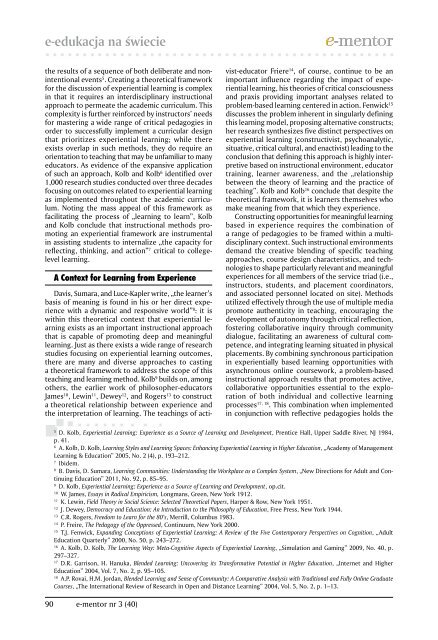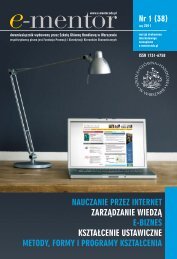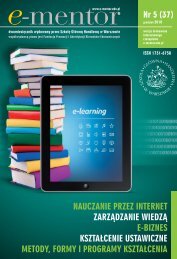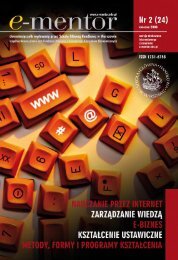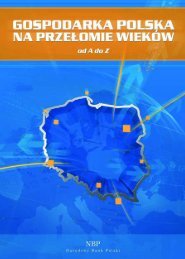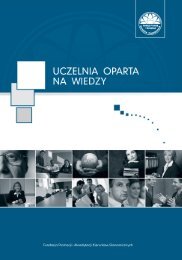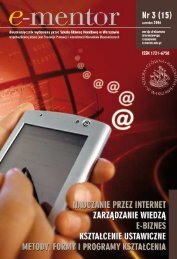metody, formy i programy ksztaÅcenia - E-mentor
metody, formy i programy ksztaÅcenia - E-mentor
metody, formy i programy ksztaÅcenia - E-mentor
You also want an ePaper? Increase the reach of your titles
YUMPU automatically turns print PDFs into web optimized ePapers that Google loves.
e-edukacja na świeciethe results of a sequence of both deliberate and nonintentionalevents 5 . Creating a theoretical frameworkfor the discussion of experiential learning is complexin that it requires an interdisciplinary instructionalapproach to permeate the academic curriculum. Thiscomplexity is further reinforced by instructors’ needsfor mastering a wide range of critical pedagogies inorder to successfully implement a curricular designthat prioritizes experiential learning; while thereexists overlap in such methods, they do require anorientation to teaching that may be unfamiliar to manyeducators. As evidence of the expansive applicationof such an approach, Kolb and Kolb 6 identified over1,000 research studies conducted over three decadesfocusing on outcomes related to experiential learningas implemented throughout the academic curriculum.Noting the mass appeal of this framework asfacilitating the process of „learning to learn”, Kolband Kolb conclude that instructional methods promotingan experiential framework are instrumentalin assisting students to internalize „the capacity forreflecting, thinking, and action” 7 critical to collegelevellearning.A Context for Learning from ExperienceDavis, Sumara, and Luce-Kapler write, „the learner’sbasis of meaning is found in his or her direct experiencewith a dynamic and responsive world” 8 : it iswithin this theoretical context that experiential learningexists as an important instructional approachthat is capable of promoting deep and meaningfullearning. Just as there exists a wide range of researchstudies focusing on experiential learning outcomes,there are many and diverse approaches to castinga theoretical framework to address the scope of thisteaching and learning method. Kolb 9 builds on, amongothers, the earlier work of philosopher-educatorsJames 10 , Lewin 11 , Dewey 12 , and Rogers 13 to constructa theoretical relationship between experience andthe interpretation of learning. The teachings of activist-educatorFriere 14 , of course, continue to be animportant influence regarding the impact of experientiallearning, his theories of critical consciousnessand praxis providing important analyses related toproblem-based learning centered in action. Fenwick 15discusses the problem inherent in singularly definingthis learning model, proposing alternative constructs;her research synthesizes five distinct perspectives onexperiential learning (constructivist, psychoanalytic,situative, critical cultural, and enactivist) leading to theconclusion that defining this approach is highly interpretivebased on instructional environment, educatortraining, learner awareness, and the „relationshipbetween the theory of learning and the practice ofteaching”. Kolb and Kolb 16 conclude that despite thetheoretical framework, it is learners themselves whomake meaning from that which they experience.Constructing opportunities for meaningful learningbased in experience requires the combination ofa range of pedagogies to be framed within a multidisciplinarycontext. Such instructional environmentsdemand the creative blending of specific teachingapproaches, course design characteristics, and technologiesto shape particularly relevant and meaningfulexperiences for all members of the service triad (i.e.,instructors, students, and placement coordinators,and associated personnel located on site). Methodsutilized effectively through the use of multiple mediapromote authenticity in teaching, encouraging thedevelopment of autonomy through critical reflection,fostering collaborative inquiry through communitydialogue, facilitating an awareness of cultural competence,and integrating learning situated in physicalplacements. By combining synchronous participationin experientially based learning opportunities withasynchronous online coursework, a problem-basedinstructional approach results that promotes active,collaborative opportunities essential to the explorationof both individual and collective learningprocesses 17, 18 . This combination when implementedin conjunction with reflective pedagogies holds the5D. Kolb, Experiential Learning: Experience as a Source of Learning and Development, Prentice Hall, Upper Saddle River, NJ 1984,p. 41.6A. Kolb, D. Kolb, Learning Styles and Learning Spaces: Enhancing Experiential Learning in Higher Education, „Academy of ManagementLearning & Education” 2005, No. 2 (4), p. 193–212.7Ibidem.8B. Davis, D. Sumara, Learning Communities: Understanding the Workplace as a Complex System, „New Directions for Adult and ContinuingEducation” 2011, No. 92, p. 85–95.9D. Kolb, Experiential Learning: Experience as a Source of Learning and Development, op.cit.10W. James, Essays in Radical Empiricism, Longmans, Green, New York 1912.11K. Lewin, Field Theory in Social Science: Selected Theoretical Papers, Harper & Row, New York 1951.12J. Dewey, Democracy and Education: An Introduction to the Philosophy of Education, Free Press, New York 1944.13C.R. Rogers, Freedom to Learn for the 80’s, Merrill, Columbus 1983.14P. Freire, The Pedagogy of the Oppressed, Continuum, New York 2000.15T.J. Fenwick, Expanding Conceptions of Experiential Learning: A Review of the Five Contemporary Perspectives on Cognition, „AdultEducation Quarterly” 2000, No. 50, p. 243–272.16A. Kolb, D. Kolb, The Learning Way: Meta-Cognitive Aspects of Experiential Learning, „Simulation and Gaming” 2009, No. 40, p.297–327.17D.R. Garrison, H. Hanuka, Blended Learning: Uncovering its Transformative Potential in Higher Education, „Internet and HigherEducation” 2004, Vol. 7, No. 2, p. 95–105.18A.P. Rovai, H.M. Jordan, Blended Learning and Sense of Community: A Comparative Analysis with Traditional and Fully Online GraduateCourses, „The International Review of Research in Open and Distance Learning” 2004, Vol. 5, No. 2, p. 1–13.90 e-<strong>mentor</strong> nr 3 (40)


